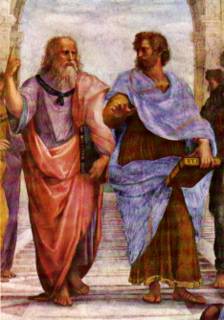Plato - holding the Timaeus - Pointing up as a sign of his metaphysical belief in the higher world of the forms, shown with the face of Leonardo.
Aristotle - holding his Ethics with hand palm down, reflecting a more grounded approach to the problem of universals.
I wanted to remind people of something quite profound as we look at Raphael's picture above. That it would be in such a position as that of the signatores relation, had been more of hindrance to me. Here, any document with which was to be signed, as representing the whole Catholic Church.
I would have liked to have seen the better message be, that this room would sign all faiths, all religions, to something built into each of us. It is something that we will take from pondering such a picture. It will become part of us.
 PLato saids,"Look to the perfection of the heavens for truth," while Aristotle saids "look around you at what is, if you would know the truth" To Remember: Eskesthai
PLato saids,"Look to the perfection of the heavens for truth," while Aristotle saids "look around you at what is, if you would know the truth" To Remember: EskesthaiI wanted to create this post as it has been sitting on my mind right from the every beginning and inception of this Blog. While my discription had been drawn from historical reference, the stage(Arch), from this beginning, is a interesting one.
Without the ability to have teachers hold one's hand all the way through the process to knowledge development, it was necessary that confidence be built into any who would adventure to such learning and research. So I developed a early a conceptual framework that would draw attention to "insight developement" through states of "correlation of cognition," as signs evident in, the natural world around us.
These were important features of model consumptions, and the "simplestic idealizations" behind their developement. If you saw this from working the model, then what value any prediction, and if you had saw insightually into the workings?
Right and Left
I came across this thinking in my adventures, where such distinctions held in the opening at the top of this page, might had arisen from left and right brain people? Would have been attributed to characteristics of the very minds who involved themself in the ways with which they might approach science today? Brain matter is encase, are our minds too?
There seems to be something special about positions historically identified to current day researchers? This came to me while I was doing early research on Plato and Aristotle themself. Underneath this picture, painted in the center, Plato and Aristotle stand. Look at what had been taken for further inspection below. What does it's link imply?
Plato:
Look to the right of Raphael's painting lower right hand corner. Look at the link this picture is connected too?
What was even more provoking, was the way in which I could see this arche identified in oppositions of scientists, who would lead us into the explorations of what and how we have come to where we are today.
Can you see yourself in the figures of fathered archetypes, embedded within our consciousness, to have known, that such an evolution was part and parcel of the scientific process in the developement of your very own minds?
"I would like to be like Feynman," yells Lubos, dememaning all philosophical adventures, while Anon screams, "no, I am Feynman." I would say you both have your place in all this. We just didn't recognize where it would come from, so we emmulated our teachers, and the teachers before them? Oh dear Aristotle, how are you?
Feynman and Gellman
For instance let us say that Feynman's thnking was more like Artistoles, while Gellman's Plato's
What was distinctive about either was that one, Gellman saw eternal and immutable patterns inhernet in the phenomena of the material world, while, Aristotle saw these as myth? Feynmen worshiped nature itself.
While discarding the myth, as philosphical pandering, are you a Feynmen who sees what is underlying, as a possible abstraction? If so, you would have been in good company with Robert Laughlin and the issues of condense matter physicist, and the relevance of building blocks of nature as, irrelevant? Oui! NOn?
Not by inception of strings that had implied itself as a discriptor of the very underlying feature of all that exists? How could we have seen that such a expression and revolt would have taken such thinking to further the basis of the standard model, to incorporate the graviton? To have conceptually incorporated the "Bulk."
You needed Plato?:)

No comments:
Post a Comment